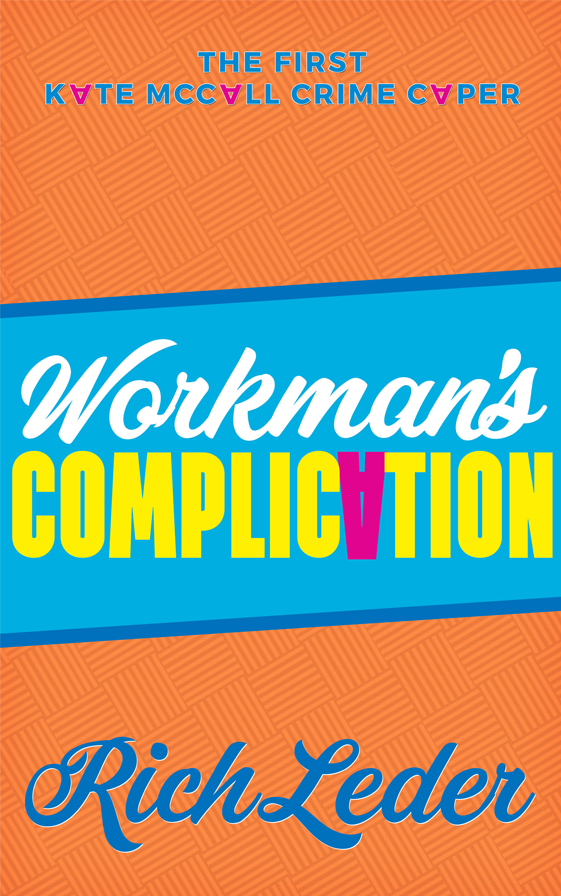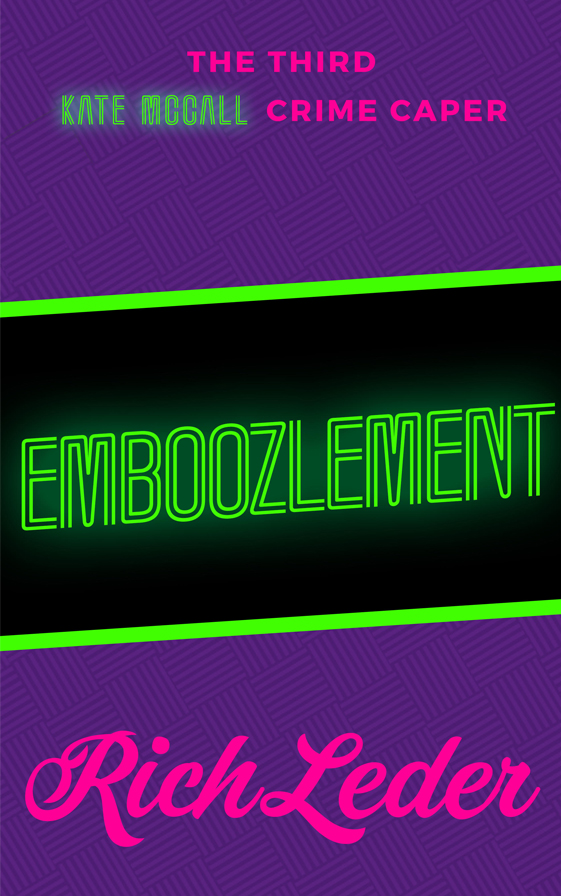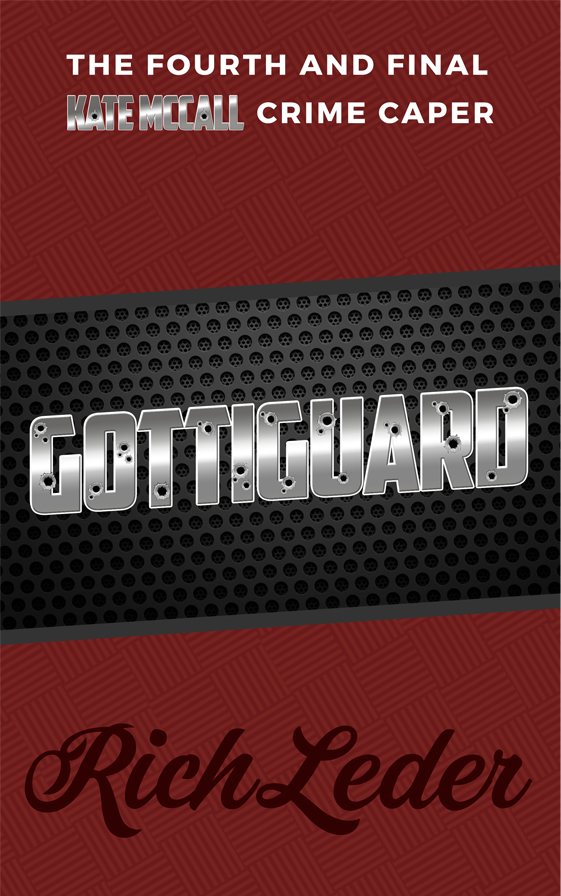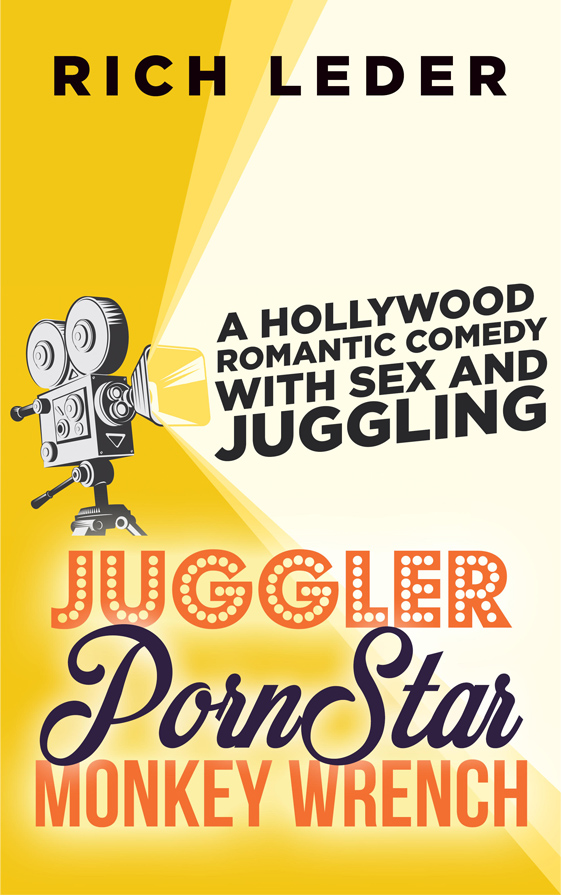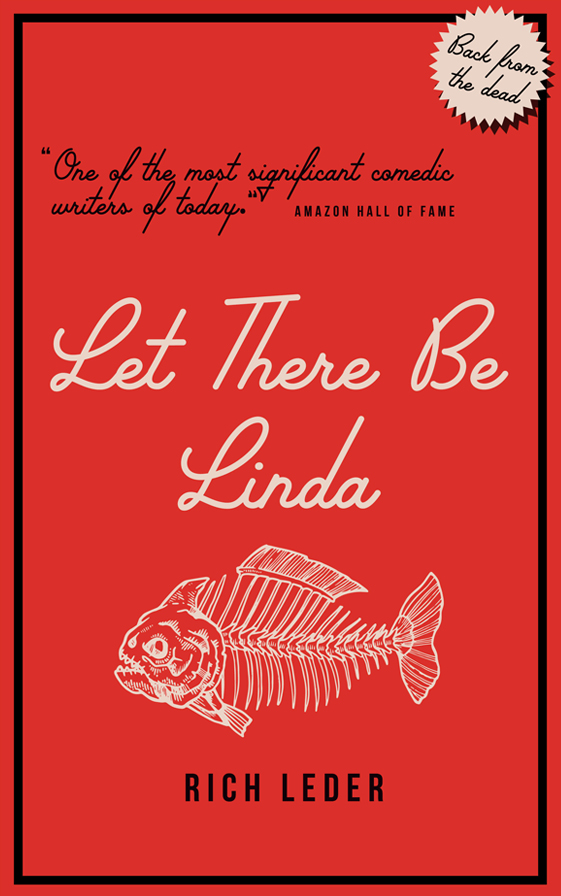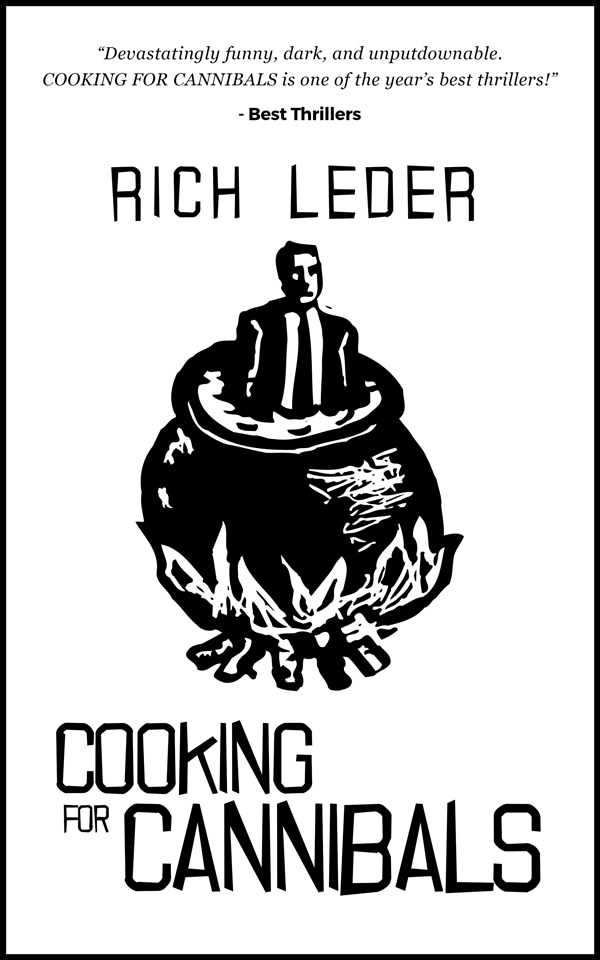RICH LEDER
Sometimes it’s entertaining to learn a little bit about the writer who wrote the book you’re going to read or just did read or might read one fine day.
If the books are meant to be funny (like mine are), it occasionally turns out the writer has lived an improbable life with a sidebar of lunacy. That’s a reasonable description of what’s happened to me. How the heck did you get to this moment in time that you’re writing funny books? is a question I hear a lot.
My Work
- Gottiguard, The Fourth & Final Kate McCall Crime Caper, 2022, Laugh Riot Press
- Cooking for Cannibals, 2021, Laugh Riot Press
- Emboozlement, The Third Kate McCall Crime Caper, 2017, Laugh Riot Press
- Let There Be Linda, 2015, Laugh Riot Press
- Swollen Identity, The Second Kate McCall Crime Caper, 2013, Laugh Riot Press
- Workman’s Complication, The First Kate McCall Crime Caper, 2012, Laugh Riot Press
- Juggler, Porn Star, Monkey Wrench, 2008, Laugh Riot Press


- The Treasure Of The Saints, Grand Prods., CBS Productions, 2001
- Special Occasions (from the play by Bernard Slade), Ave. Pictures, 2000
- The Murder Of Ed Cates, Nasser Entertainment, CBS Entertainment, 2000
- The Miracle Of Jenna Rose, Hearst Entertainment, 1999
- The Leather Brace, Nasser Entertainment, CBS Entertainment, 1999
- Main Street (from the novel by Sinclair Lewis), NBC Productions, 1998
- Secret Harvest, Adelson Entertainment, CBS Entertainment, 1997
- Every Mother’s Nightmare, Silver Creek Productions, MTM, 1996
- Motive to Murder, Longbow Productions, CBS Entertainment, 1996
- Into The Flames, Atlantis Films, CBS Entertainment, 1995
- The Judi Striano Story, Grant Productions, CBS Entertainment, 1994
- Primal 2019, Lionsgate
- Mindscape, 2010, Working Man Productions
- The Tent, 2009, Left Bank Films
- Cigarette Girl, 2006, Working Man Productions
- Blackbird at Busters, 2005, Working Man Productions
- Wildflowers, 2003, Cape Fear Films
- Hollywood Kryptonite (from the book by Sam Kashner), 2002, Cole Films
- Persona Non Grata, 1998, Itasca Pictures
- Crazier Than Thou, 1996, Tri-Star Pictures
- Color War, 1995, Dan Redler Productions
- Eleanor, 1995, Saraband Productions
- Regular Kids, NDY Productions, Director, 2010
- Rag + Bone, Ethos Productions, Writer/Director, 2009
- The Bad Son, Nasser Entertainment, 2006, Catherine Dent, LIFETIME
- Unthinkable, Nasser Entertainment, 2006, Michelle Forbes, LIFETIME
- Christmas On Chestnut Street, Nasser Entertainment, 2006, Kristen Dalton, LIFETIME
- Amber’s Story, Nasser Entertainment, 2006, Elizabeth Rohm, LIFETIME
- The Suspect, Nasser Entertainment, 2005, Jamie Luner, LIFETIME
- Scared Silent, Von Zerneck Sertner Productions, 2002, Penelope Ann Miller, Reed Diamond, LIFETIME
- The Last Brickmaker In America, Nasser Entertainment, 2000, Sidney Poitier, Jay O. Sanders, Wendy Crewson, CBS
- Yesterday’s Children (from the book “Across Time and Death” by Jenny Cockell), Cosgrove Meurer Productions, 2000, Jane Seymour, Clancy Brown, Hume Cronyn, CBS
- One True Love, Orly Adelson Productions, 2000, David Hasselhoff, Terry Farrell, Doris Roberts, CBS
- In The Name Of The People (from the play by Tim Boland), Gary Bart/43 Productions, 1999, Scott Bakula, Amy Madigan, CBS
- A Father’s Choice, Sofronski Productions, Nasser Entertainment, 1999, Peter Strauss, Mary McDonnell, CBS
- God’s New Plan, Orly Adelson Productions, 1998, Katey Sagal, Annabeth Gish, Alison Pill, Tom Irwin, CBS
- 1,000 Men And A Baby, Finnegan-Pinchuk Productions, 1997, Gerald McRaney, Richard Thomas, Jonathan Banks, CBS
- A Stranger To Love, Longbow Productions, 1996, Beau Bridges, Tess Harper, Pam Dawber, CBS
- Our Son, The Matchmaker, Alexander-Enright Productions, 1996, Ann Jillian, Ellen Burstyn, David Andrews, CBS
- A Season Of Hope, Signboard Hill Productions, Hallmark, 1995, JoBeth Williams, Stephen Lang, Ralph Waite, CBS
My Life
-
1978
I graduated from Lafayette College in 1978 and moved immediately to New York City to become a screenwriter.
I studied screenwriting at the New School, wrote movies, played in kick-ass rock bands, and worked in restaurants for 10 years. Along the way I got married and worked for a commercial real estate developer, a mind-numbing two years toward the end of our New York decade that led my wife to say that if writing films was my calling, then the commercial real estate we needed to focus on was Los Angeles.
-
1989
We went west in 1989 and landed in the San Fernando Valley, a vast community within shouting distance of all the film and television action in LA.
Three of my novels are set in the San Fernando Valley, a place where disparate craziness is de rigueur, where the improbable is not simply possible, it’s happening.
-
Los Angeles Years
I became a reader. Each year in Los Angeles, there are in excess of 50,000 scripts registered with the Writers’ Guild of America west (WGAW) that need to be read, thought about, and decided upon. Short stacks of scripts turn quickly into tall towers because executives, producers, agents, actors, and directors are often too busy making deals and films to keep up with their own reading. This critical first step in the life of a script is regularly assigned to a reader. A reader, obviously, reads the screenplay and then writes what is known as coverage, more or less a book report on the script—a log line, a two-page synopsis, a half page of comment, and a recommendation: pass or consider.
-
Reading Scripts
For two and a half years, I read scripts for CAA, MGM, Showtime, Universal, and a dozen more agencies and production companies around LA. I read, on average, seven scripts per week, probably 50 weeks per year—somewhere in the neighborhood of 900 total scripts. It was a kind of a screenwriting-storytelling graduate school. Looking back, I wouldn’t trade that time for any other entry-level writing job.
-
1995
Wrote A Feature Film
During my reader years, I wrote a feature film that an agent loved and a studio optioned. Suddenly, I was a member of the WGAW. That studio sold my script to another studio, which handed it to a production company, which set it up with Hallmark. A Season of Hope was produced in 1995 for CBS. I had written and optioned it as a feature, but with three children under the age of three, I happily did the rewrites to turn it into a television film. The movie had high ratings, CBS hired me to write another one, and my professional career was begun. It had only taken me 16 years to get it going.
-
Scripts Produced
In the years that have followed, my scripts have been produced 19 times, not bad when you think about what a miracle it is to get even one screenplay produced anywhere by anyone.
-
Moved to North Carolina
After seven years in Los Angeles, and seven more in Santa Barbara, my family moved across the country, near the beach on the southern tip of North Carolina, the Cape Fear Coast. Six of my produced films were written here. For three years, when we first arrived, I taught screenwriting as a guest artist and member of the visiting faculty at the University of North Carolina Wilmington (UNCW). I liked teaching, especially the side-by-side relationships I developed with my young writers.
-
2008
Wrote My First Novel
In 2008, I wrote my first novel, Juggler, Porn Star, Monkey Wrench, a romantic, Hollywood sex comedy that more or less tells the story of my unlikely life in LA. Some of the book is exactly true, some is inexactly true, but all of it is true enough.
-
2014
Started Laugh Riot Press
I wrote four novels after completing Juggler, the first three books in the Kate McCall Crime Caper series—Workman’s Complication, Swollen Identity, and Emboozlement—and the dark comic thriller Let There Be Linda. Then, in 2014, I launched Laugh Riot Press, my publishing imprint, to release and promote my books.
-
2019
Wrote Primal and Cannibals
An action thriller script I wrote early on, Primal, caught a buzz and was produced in Puerto Rico. Starring Nicolas Cage, it was released domestically by Lionsgate in November 2019. It had a nice little theatrical run and now lives forever On Demand. Plus, I wrote a delicious dark comic thriller called Cooking for Cannibals—way outside the box…what box?—that is scheduled for release in January 2021.
-
So I’m a screenwriter and novelist who writes funny books.
It’s been a crazy ride so far. I’ve been the lead singer in a Detroit rock band, a restaurateur, a Little League coach, an indie film director, a literacy tutor, a magazine editor, an executive director, a screenwriting coach, a PTA board member, a commercial real estate agent, and a sleep-away camp counselor, among other things. And now I’m novelist who writes funny books. I think that’s where I was headed all along.
Q & A
Do you have any unique talents or hobbies?
Not so much talents or hobbies, but I have an unexpected unique knowledge. I know everything there is to know about wedding planning and weddings. Not kidding. I really do.
What advice would you give to your younger self?
Pursue what you love from the moment your pursuit begins and never stop.
Favorite Novels?
Too many. Here are some off the top of my head: The Sportswriter (Richard Ford), A Widow for One Year (John Irving), Trust Me On This (and lots of other novels by Donald E. Westlake), plenty of novels by Carl Hiaasen, everything by John D. MacDonald and Philip Roth, five or six or more by Chuck Palahniuk, a bunch by Christopher Moore…so many others…
Favorite Movies?
Same as favorite novels, too many to think about. The Godfather I and II. Mississippi Burning. Mel Brooks’ especially crazy stuff. Woody Allen’s early crazy stuff. Everything by Monty Python. Almost everything by Tarantino. Early Eastwood westerns. Some stuff by Spielberg and Cameron and Wes Anderson and Spike Lee…so many others…
Which writers inspire you?
Richard Ford, James Irving, Philip Roth, Donald E. Westlake, John D MacDonald, Chaucer, Stephen King, Elmore Leonard, Shakespeare, Carl Hiaasen, Janet Evanovich, Frank Herbert, Ray Bradbury, Chuck Palahniuk, Christopher Moore…so many others.
When did you decide to become a writer?
I don’t think I ever decided to become a writer. I think the author in me decided to assert himself when I was a kid and that was the end of that. I have been a writer since then. Since I was a kid.
What do you love most about writing?
Constructing sentences. To this day, I still love to write a sentence, read it out loud (so that I hear it) and say to myself, Man, that’s a good sentence.
Do you have a hero?
I do. My father. He passed in 2010, and I have missed him every day since then. My dad was the nicest, best guy I ever met. He was kind and fun and funny and fabulous. Total straight shooter. Great sense of humor. Loved to laugh and to make other people laugh. Hard-working. Generous. So generous. Loved sports and music and books and movies and food and family. Loved a good story, to tell one and to hear one. If we were the same age, we would have been great friends. I didn’t just love my dad; I like him too. Bob Leder was the best of the best. And everyone who ever knew him says that. I can never quite fill his shoes. But that’s another conversation…
When you’re writing, what are you listening to?
The voices of my characters. How do you know how they sound if you don’t hear them? You think you can hear them in your head? Think again. Your ears are in charge of hearing sounds, including voices. Your brain is in charge of telling you how awesome you are so you’ll stop writing because writing is hard. Your brain is lazy and it wants you to do something much easier than write sentences and paragraphs and chapters.
What are some random things you believe are true?
The book I’m writing at the moment I’m writing it, no matter what book or what moment that is, is the best book I’ve ever written in my whole life ever. It’s true for my scripts and my novels. Whatever I’m working on at the time I’m working on it is the best thing I’ve ever done. I don’t know why that is. But it’s true.
A downtown football stadium is way better for a city than a football stadium that isn’t downtown. My awesome wife, Lulu, and I were visiting Seattle. It was the first time we’d ever been there. There are a slew of bars and galleries in a cool neighborhood called Pioneer Square in the southwest corner of downtown Seattle, so on a crisp and clear Sunday afternoon, we set out to drink a bit of bourbon and look at some art. We knew that it was the opening day for the Super Bowl champion Seahawks and that they were playing at home, but we didn’t know that Pioneer Square was a short walk to the stadium, CenturyLink Field, and we found ourselves in the middle of 67,000 maniac Seahawk fans, all of them wearing home team jerseys, many people painted in Seahawk colors. The place was a super-fun zoo. Seattle was electric and alive, filled with team spirit. Having the stadium downtown was spectacular for the bars, for the fans, and for the city. In contrast, my team, the New York Giants, play in a swamp somewhere on the other side of the Hudson River in New Jersey. I love my team and my city, but there’s no comparison. New York is missing out big-time by not having a football stadium right downtown.
There’s nothing wrong with being lucky. I didn’t always feel this way. When I was young and working in LA, writing television movies for CBS and Hallmark and Lifetime and feature films for studios and production companies, I wanted to think my success was entirely due to the fact that I was a wonderful screenwriter. It was all due to craft, talent, and skill. It wasn’t true. I was good at my job, and I worked hard… and I was lucky. Looking back, I see just how lucky I was. My timing was perfect. Yes, yes, timing is partly a function of hanging in there until the wheel turns all the way around to where you are, but it’s largely luck because the wheel can turn and turn and turn and never find you, no matter how long and hard you hang in there. I was lucky to land in a place and time where the executives were making movies and liked the way I worked, the way I told stories. If there were other personalities in that room at that moment in time, who knows what would have happened? Something else, that’s what. Being lucky is a good thing. It’s part of life. I hope you’re lucky along the way. I hope I am too.
My books will make you laugh out loud. I really think so. And more than that, I really hope so. I love to laugh, and I love making other people laugh. I make myself laugh when I’m writing my books, and I think you’ll laugh too when you read them.
Writing funny books is hard! What are your top three tips for writing comedy?
You have to think you have a funny idea for a story. Which means you have to believe you have a terrific sense of humor. If you don’t think of yourself as funny, then it’s possible that writing comedy isn’t your thing. For example: I believe I have a great sense of humor. So it feels natural for me to write funny books. Am I funny? I am. If we emailed each other (and we should), I’m sure we’d make each other laugh. Wouldn’t that be fun?
Look for the funniest way to transfer the story information to the reader. If you’ve outlined or beat out your book, then you know in advance your plot points have to happen in a certain way for your story to causally move forward. So ask yourself: What’s the funniest way I could write this scene that would remain true to the composition of my characters and to the story world I’ve created? If you’re writing a funny book, that’s the question you should ask yourself fifty times a day.
Crack yourself up. If you’re laughing out loud at the story you’re writing, then other people will laugh too.
What genres do you think work best with humor?
What genres don’t work best with humor? Think of the saddest, most dramatic story you know. There was probably humor all the way through it. I’ve written movies that were so sad, my awesome wife, Lulu, who’d spent two hours weeping while watching the film, punched me in the arm and told me never to do that to her again. And yet, she laughed throughout the film as well. Westerns can be hilarious. Westerns? Yes. Blazing Saddles. Science fiction works great with humor. For Pete’s sake, cookbooks work great with humor.
I suppose for me, romance works best with humor. I think love and romance and sex are hilarious. Watching one human twist into a pretzel over another human they’re sexually and romantically attracted to can be funny ha-ha and funny why-the-heck-am-I-laughing-at this?-That-poor-guy-is-me. I think mystery works maybe not best, but really great with humor. (I must think that; I write a funny mystery series.) And coming-of-age stories work best with humor too. And I write dark comic thrillers, so comedy works there too.
What are a few of your favorite funny books?
Here’s five off the top of my head:
Fear and Loathing in Las Vegas by Hunter S. Thompson
Catch 22 by Joseph Heller
Portnoy’s Complaint by Philip Roth
Without Feathers by Woody Allen
A Confederacy of Dunces by John Kennedy Toole
Trust Me On This by Donald E. Westlake
Me Of Little Faith by Lewis Black
Carl Hiaasen…any of them.
Chuck Palahniuk…lots of them.
Christopher Moore…all of them.
Yeah, I know. That’s more than five.
What about your KATE MCCALL CRIME CAPER characters surprised you while writing?
How important each one of them told me they were. Of course, Kate McCall is the star of the show, and she was very clear about that from the get-go. Both she and I expected her tenants in the House of Emotional Tics and her way-off Broadway acting company, the Schmidt and Parker Players, to understand that fact and behave accordingly. But not a one of them did. In every instance, they were so vibrant and real and living actual, dysfunctional/functional New York City lives, that they refused to be contained. It’s all Kate can do to hold her own, solve her case, and find her father’s killer.
How much of yourself is hidden in the characters in your books?
Plenty. I think writers often stumble upon a conscious spark of essence in some aspect of their being that appeals to them in a universal way, meaning they think if this aspect is so strong and identifiable in them, then it must be so in others as well. And these kinds of things filter into their characters because they have to, because that’s what makes their characters three-dimensional people that readers recognize as real. It’s what makes books resonate for weeks and months and longer after you put them down. It’s not so much the story as it is the characters that are living it. Anyway, that’s what happens to me.
Do you have an ideal reader in mind when you write?
I write funny books with smart/crazy/dark/fast-paced/well-crafted stories and eccentric characters. I’m a fast, fun, and easy read. So I’m writing for readers who want to jump off the speeding train of their lives for a few minutes and get lost in a world of lunatics maneuvering through stories that charge causally forward and make them laugh out loud, sometimes as they’re wincing or covering their eyes. My life is so full and insane sometimes that all I want to do is sit on my screened porch and disappear in a book that transports me—heart and soul and sense of humor—to somewhere/anywhere else. Just give me a few out-of-the-box minutes. That’s all I ask. I’m not special, so I think lots of readers feel the same way.
What are five true things you’ve learned about writing novels and movies?
You know how much effort you put into making your characters three-dimensional, living-breathing human beings who are flesh and blood and heart and soul and so present and real that they’re sitting in your office telling you what they’re going to say and do next? That’s how much effort you have to put into your setting.
How can your characters convince your readers that they’re falling in love, or running from the law, or battling space aliens, or living tortured suburban lives if the place they’re doing these things is thin and false and nowhere? They can’t.
If you’re intending to sweep the reader off to a foreign land or a distant planet or New York City (my setting) or the San Fernando Valley (also my setting), then you better write that place as vibrant and electric and alive as you can. You have to transport the reader there with nothing but words, and the only way they’re happily going with you is if you make it real.
If it’s a foregone conclusion that your good guy is going to win, then it’s a foregone conclusion that your reader will lose interest. Keep in mind your antagonist doesn’t have to be human. A plague could be your antagonist, or a tornado, or an alien species bent on eliminating our entire race, or a disease that threatens your hero’s life or the lives of everyone on earth, or a bad boss, or a Civil War, or a great white shark, or a great white whale.
No matter the adversary, your protagonist must be overmatched for whatever task you have written for them. It has to seem like there’s no way she can prevail. That the odds are too steep, the mountain is too high (yes, your antagonist can be a mountain), the ocean too wide, the river too deep.
If you don’t do this (or if I don’t do it), if your hero is so heroic that nothing can stop them from reaching their goal, then you can count on your reader to stop reading. In screenplays and novels, it has to seem like nothing can beat the bad guy.
Maybe your character overslept and is late for the most important meeting of the year. Maybe it’s early evening and your character’s five o’clock shadow is showing. Maybe it’s winter. Maybe three weeks have gone by. Maybe three generations.
Stories don’t happen free of time. In the same way they are set somewhere specific, they happen in a certain timeframe—Independence Day weekend, the 1960s, World War II, a certain time.
And that means a certain amount of time is passing as you tell your story. Let me say that again: time is passing for your characters as your story unfolds. Attitudes change over time. Appearances change over time. Relationships change over time.
People change over time.
How does that impact your characters? How does that impact your story? Be aware of time when you’re writing. You’re readers are well aware of it. If it’s absent, then they will be too.
If you’re writing dialogue and not reading it out loud and in character to yourself, then you are missing the point of dialogue, which is just exactly this: these are words that your characters say to each other that are meant to be spoken out loud, as in heard by the ear.
Everyone gets that in Hollywood, where they hire actors to say the dialogue out loud. (I didn’t say everyone writes good dialogue in Hollywood. I said they understand that dialogue is not meant to be heard inside one’s head.)
When it’s done right, the words match the disposition, education, occupation, motivation, and life station of that particular character. But it’s hard to know if it’s done right if you’re reading it silently.
That’s because your brain will lie to you every time. Oh, young writer, are you kidding me with this dialogue? It’s brilliant! Move on. There’s nothing more to do here. Let’s have a drink and a bon bon and celebrate the magnificence that is your dialogue. Yes, that’s your brain.
Your ear doesn’t do that. Oh, young writer, are you kidding me with this dialogue? Can you not hear that? It’s stilted and unnatural and devoid of all character logic. There’s no way this character would say anything remotely like that. Get your butt back in the chair and write it again. That’s your ear.
Try it. Read it out loud and in character. Your ear will tell you the truth.
With screenplays, one beat causes the next beat causes the next beat causes the next beat and so on to the end. After writing 56 movies, the whole causal motivation thing has been ingrained into my writer DNA. It turns out to be true for writing novels too.
Yes, time can the jump any which way in a novel, and you can spend pages, chapters even, inside a character’s mind and heart, riding the waves of their innermost thoughts and secrets, but if these deepest feelings aren’t motivated by something else and then don’t lead to something else—more thoughts or, better yet, some kind of action—then your story is stuck in the muck and your reader will jump off the bus.
Which means the answers to your hero’s problems don’t fall from the sky (unless your story is about answers falling from the sky…and then that better be causally motivated too).
In all storytelling, I think, writers must causally motivate their plotlines and their character arcs. Do I practice what I preach? I hope so. I try to.


